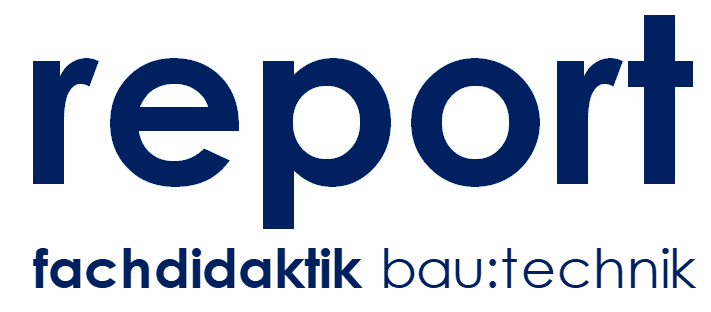BIM-Kompetenz und BIM-Lernfelder : didaktischer Ansatz zur Umsetzung in der Beruflichen Bildung im Bauwesen
Das Ministerium für Heimat, Kommunales, Bau und Gleichstellung Nordrhein-Westfalen (MHKBG NRW) fördert die BIM-Qualifizierung in den nordrhein-westfälischen Kommunen durch die Er-stellung eines BIM-Qualifizierungsleitfadens für die kommunalen Bauverwaltungen und die kommunale Gebäudewirtschaft in Nordrhein-Westfalen.
Ziel des BIM-Qualifizierungsleitfadens ist es, Mitarbeiterinnen und Mitarbeiter in kommunalen Verwaltungen, kommunalen Betrieben und anderen kommunal geprägten Institutionen in die Lage zu versetzen, ihren individuellen BIM-Qualifizierungsbedarf systematisch feststellen und daraus selbstständig notwendige BIM-Schulungen ableiten zu können. Der Lehr- und Forschungsbereich Fachdidaktik Bautechnik der Universität Duisburg-Essen erstellt im Rahmen der wissenschaftlichen Begleitung einen didaktischen Ansatz zur BIM-Qua-lifizierung, welcher innerhalb des Leitfadens angewendet wird.
Basierend auf einer eingehenden Grundlagenermittlung, sowohl aus technischer als auch aus berufspädagogischer Sicht, werden die theoretischen Bezüge zur Definition der individuellen BIM-Kompetenz dargelegt wie auch der didaktische Ansatz entwickelt für die Bestimmung und Anwendung von BIM-Lernfeldern. Die entwickelten BIM-Lernfelder sind generalisierte, niveauangemessene Beschreibungen von Kernkompetenzen, welche für Handlungen im individuellen Arbeitsumfeld durch die Einführung der BIM-Methodik erforderlich sind. Der hier vorgestellte Lernfeldansatz stellt einen Rahmen dar, in welchem sich sowohl Lehr-Lern-Themen als auch die darin enthaltenen Inhaltsbausteine evolutionär entwickeln können. Abhängig von der weiteren Entwicklung der BIM-Methode bzw. der allgemeinen Entwicklung der Digitalisierung im Bauwesen können somit die Themen und Inhalte dynamisch an den Bedarf der Zielgruppen angepasst bzw. erweitert und innerhalb der BIM-Lernfelder integriert werden.
Ziel des BIM-Qualifizierungsleitfadens ist es, Mitarbeiterinnen und Mitarbeiter in kommunalen Verwaltungen, kommunalen Betrieben und anderen kommunal geprägten Institutionen in die Lage zu versetzen, ihren individuellen BIM-Qualifizierungsbedarf systematisch feststellen und daraus selbstständig notwendige BIM-Schulungen ableiten zu können. Der Lehr- und Forschungsbereich Fachdidaktik Bautechnik der Universität Duisburg-Essen erstellt im Rahmen der wissenschaftlichen Begleitung einen didaktischen Ansatz zur BIM-Qua-lifizierung, welcher innerhalb des Leitfadens angewendet wird.
Basierend auf einer eingehenden Grundlagenermittlung, sowohl aus technischer als auch aus berufspädagogischer Sicht, werden die theoretischen Bezüge zur Definition der individuellen BIM-Kompetenz dargelegt wie auch der didaktische Ansatz entwickelt für die Bestimmung und Anwendung von BIM-Lernfeldern. Die entwickelten BIM-Lernfelder sind generalisierte, niveauangemessene Beschreibungen von Kernkompetenzen, welche für Handlungen im individuellen Arbeitsumfeld durch die Einführung der BIM-Methodik erforderlich sind. Der hier vorgestellte Lernfeldansatz stellt einen Rahmen dar, in welchem sich sowohl Lehr-Lern-Themen als auch die darin enthaltenen Inhaltsbausteine evolutionär entwickeln können. Abhängig von der weiteren Entwicklung der BIM-Methode bzw. der allgemeinen Entwicklung der Digitalisierung im Bauwesen können somit die Themen und Inhalte dynamisch an den Bedarf der Zielgruppen angepasst bzw. erweitert und innerhalb der BIM-Lernfelder integriert werden.
The Ministry of Regional Identity, Communi-ties and Local Government, Building and Gender Equality of the Land of North Rhine-Westphalia (MHKBG NRW) promotes BIM qualification in the North Rhine-Westphalian municipalities by creat-ing a BIM qualification guideline for the municipal building authorities and the municipal building management in North Rhine-Westphalia.
The aim of the BIM qualification guideline is to enable employees in municipal administrations, municipal companies and other municipal institutions to systematically determine their individual BIM qualification requirements and to derive inde-pendently the necessary BIM training courses from them. As part of the scientific support the teaching and research department of Vocational Pedagogy and Specialized Didactics in Construction Engineering at the University of Duisburg-Essen creates a didactic approach for BIM qualification, which is used within the BIM qualification guideline.
Based on an in-depth research of fundamentals, both from a technical and a vocational pedagogical point of view, the theoretical references to the definition of individual BIM competence are presented, as well as the didactic approach developed for the determination and application of BIM learning fields. The developed BIM learning fields are generalized, level-appropriate descriptions of core competencies which are required for actions in the individual work environment through the introduction of the BIM methodology. The developed BIM learning field approach represents a framework in which teaching and learning topics as well as content building blocks can evolve. Depending on the further development of the BIM methodology or the general development of digitization in construction, the teaching and learning topics as well as the content building blocks can be dynamically adapted or expanded to the needs of the target groups and integrated into the BIM learning fields.
The aim of the BIM qualification guideline is to enable employees in municipal administrations, municipal companies and other municipal institutions to systematically determine their individual BIM qualification requirements and to derive inde-pendently the necessary BIM training courses from them. As part of the scientific support the teaching and research department of Vocational Pedagogy and Specialized Didactics in Construction Engineering at the University of Duisburg-Essen creates a didactic approach for BIM qualification, which is used within the BIM qualification guideline.
Based on an in-depth research of fundamentals, both from a technical and a vocational pedagogical point of view, the theoretical references to the definition of individual BIM competence are presented, as well as the didactic approach developed for the determination and application of BIM learning fields. The developed BIM learning fields are generalized, level-appropriate descriptions of core competencies which are required for actions in the individual work environment through the introduction of the BIM methodology. The developed BIM learning field approach represents a framework in which teaching and learning topics as well as content building blocks can evolve. Depending on the further development of the BIM methodology or the general development of digitization in construction, the teaching and learning topics as well as the content building blocks can be dynamically adapted or expanded to the needs of the target groups and integrated into the BIM learning fields.

